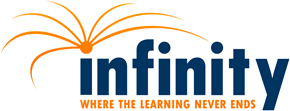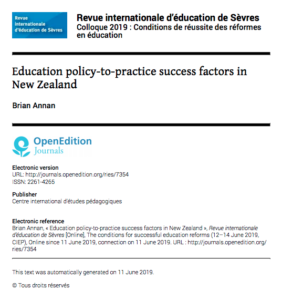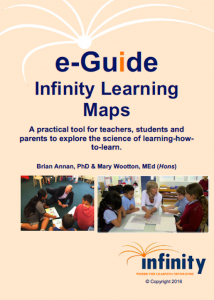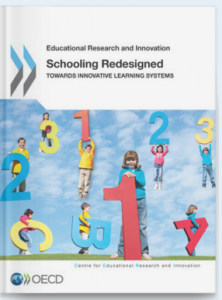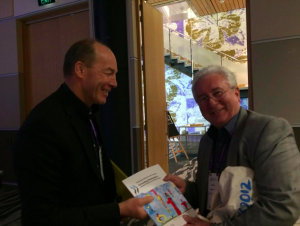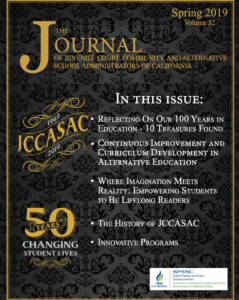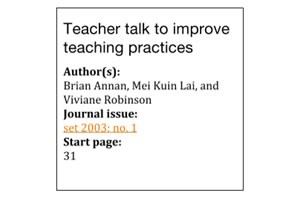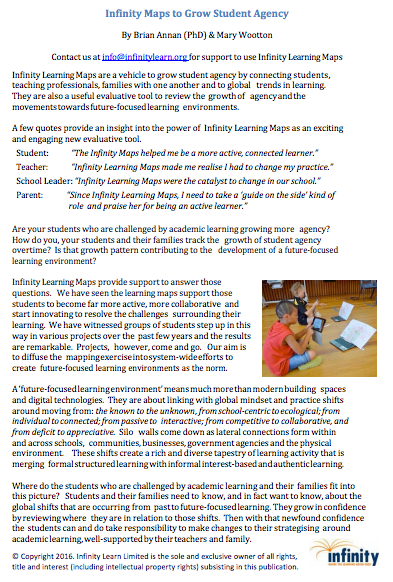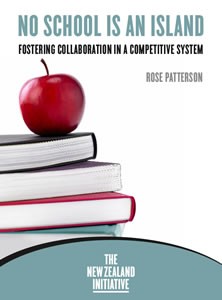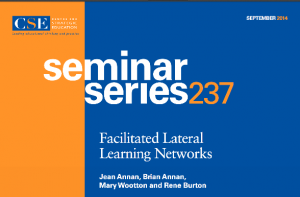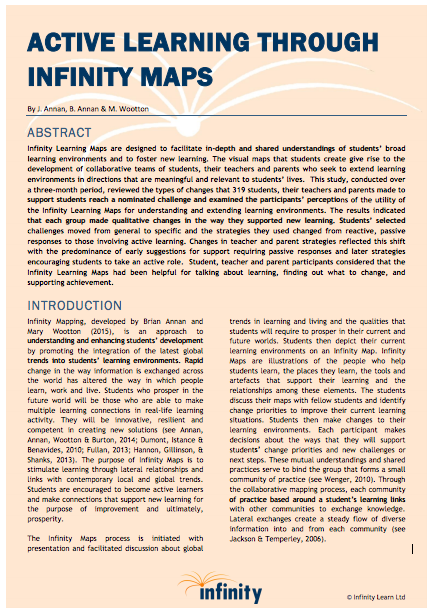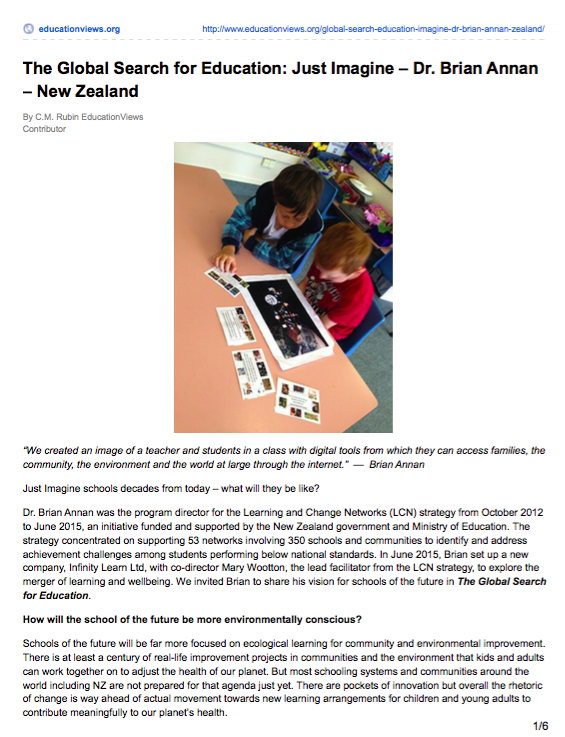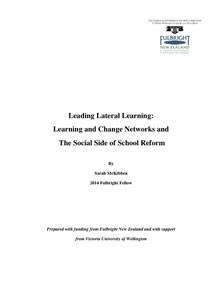Download Publication
This article is called Education policy-to-practice success factors in New Zealand. It was published in Revue internationale d’éducation de Sèvres, The conditions for successful education reforms (12–14 June 2019, CIEP). This article was written to contribute to an international conference about successful reforms hosted at CIEP in Sevres, Paris in June 2019. The abstract reads: New Zealand education system’s leaders have learned to dialogue with the people to get things done. This policy-to-practice success factor has contributed to improved local governance and management, a world-class curriculum and a strong commitment to appreciating identity and dual heritage through the Treaty of Waitangi. Now New Zealand leaders are in dialogue with the people to re-imagine success in education. A new policy called Communities-of-Learning – Kāhui Ako – is an avenue to activate the new success. The New Zealand presentation at Workshop 2 will reveal some of the early collaborative successes, such as the value of community-designed learning frameworks, collective advantage across schools and tracking learning trends.
Purchase e-Guide Resource
Grow student agency! Develop personalised learning! Grow student’s confidence in learning how to learn! Purchase e-Guide Resource for Infinity Learning Maps and have access to this innovative tool that looks at learning from a student’s perspective! The e-guide includes six interactive sections Overview, Genesis, Theory, Trends in Learning, Five Practical Steps and Research. Over 50 illustrated pages with embedded links to support videos, templates and frameworks.
Download Publication
OECD (2015). Schooling Redesigned: Towards Innovative Learning Systems, Educational Research and Innovation. Centre for Educational Research and Innovation. OECD Publishing, Paris.
“Innovation and creativity are the lifeblood of learning. Schooling Redesigned summarises beautifully one of the OECD’s most fascinating projects – an attempt to look at the DNA of innovation in schools. Using a global range of actual examples [including Learning and Change Networks in New Zealand] it describes the conditions that education systems have to create if children and their parents, teachers and communities are to feel confident and optimistic about the future. For teachers, the messages are inspiring. Education systems have to focus on enhancing teachers’ capacity and motivation. Standardisation cannot do that. Its messages to the profession and its organisations are profound.” (Professor Michael Schratz, Dean, School of Education, University of Innsbruck, Austria)
Download Publication
Are you stuck in the past, or actively thinking about new ways of engaging children and young adults in relevant learning for the future? This article profiles the outstanding efforts of educators, students and families in Monterey County to create relevant learning for the future. Case studies of students are positively profiled in a range of alternative education settings across the Country. Key themes weaved into the article to help make learning more relevant for the future include: Student Learning Plans, Positive Learning Stories and Learning Trends. These ideas challenge past ways of planning, implementing and evaluating learning for students in challenging circumstances. Have a read, reflect on your practice and enjoy making a positive contribution to kids lives for the future.
Download Publication
Annan, Lai, Robinson (2003) Teacher talk to improve teacher practices. NZCER: Set 2003, No 1.
“Teachers engaging in “learning talk” analyse, critique and challenge their current teaching practices to find and/or create more effective ways of teaching. Using three New Zealand studies, this article examines the effectiveness of “learning talk” in facilitating changes in teacher practices and beliefs, and in student achievement. It addresses the challenges to this kind of talk, and explains the role of expert support in facilitating it.”
Download Article
Download Publication
Patterson, R (2014) No School is an Island: Fostering Collaboration in a Competitive System The New Zealand Initiative.
[This publication] is the story of ‘Learning and Change Networks’ (LCN), a model of school collaboration that the government’s ‘Investing in Educational Success’ (IES) policy must learn from. The Initiative profiles the key features of LCN that enable schools to work together, and provides thinking on how to improve the IES policy to ensure the investment is worthwhile.” (Rose Patterson, The New Zealand Initiative)
Download Publication
Annan, J., Annan, B., Wootton, M., & Burton, R, (2014). Facilitated Lateral Learning Networks Seminar Series 237, Centre for Strategic Education. September. Melbourne.
“This article discusses an ecological, networked approach to growing future-focused learning environments for students whose life trajectories will differ significantly from those of previous generations. Some students now have access to massive amounts of information… and they are making learning connections across multiple sites. For others, the creation of learning connections poses a greater challenge. If educational opportunity is to be available to all children, innovative new-world learning environments will need to be manufactured. The authors suggest the facilitation of Lateral Learning Networks to make that happen. Five related ideas underpin the facilitation approach promoted by the authors to establish and operate lateral learning networks; ecological and interactive perspectives on learning, appreciation, innovation, multi-levelled social learning connections and the recognition of cultural identities”. (Dr Jean Annan, Positively Psychology, Auckland New Zealand)
Download Article
Download Article
Download Publication
McKibben, S. (2014) Leading lateral learning: learning and change networks and the social side of school reform. Fullbright New Zealand report
“Strengthen the role of facilitators in provoking challenging conversations around research relevant to LCN activities. One of the clearest takeaways from the year’s research is that LCNs need ongoing facilitation. The nature of that facilitation will change as networks mature, but there will always be a role for a facilitator to bring new research to the table, to ask for evidence, and to cross-pollinate promising strategies and tools between networks.”
